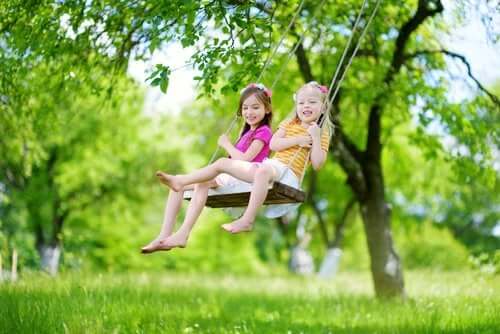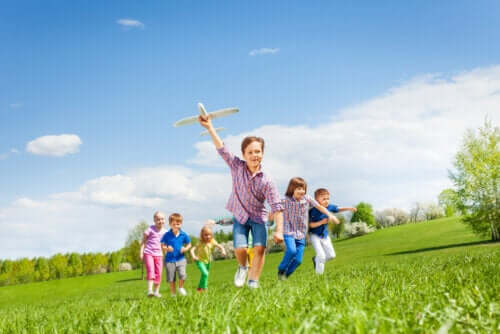How Does Contact with Nature Affect Children?


Written and verified by the social educator Natalia Cobos Serrano
In general, the amount of time children spend outdoors and in contact with nature and other living things is decreasing. Despite the many benefits of direct contact with nature for children, their daily lives are mostly spent within four walls. What’s more, the time they spend indoors consists more and more of exposure to electronic screens.
Do we need contact with nature?
Educators such as Marta López, Mario Vega, and Lucía Loren refer to a fear that’s known as “biophobia.” In other words, the fear or rejection of the natural world, is currently spreading. And this is reaching the younger population, which is problematic considering how important contact with nature is for children.
On the flip side, however, we have what is known as “biophilia.” According to sociobiologist Edward Osborne Wilson, this is the need to get close to other forms of life.

In other words, biophilia is an innate attraction to life and nature in all its manifestations. Contact with nature is, therefore, a human need.
Also, for Wilson, it’s a sign of mental and physical health. He argues that contact with other species, whether animal or plant, can produce positive and important changes in health, knowledge, and overall well-being.
“All people, but especially children, need nature, we feel spontaneously attracted to it and, in its contact, we develop in the healthiest way at all levels.”
– Lucía Loren –
Now, based on the threat of biophobic tendencies that are being generated nowadays, we need to favor biophilia. This is because of the important impact it has on individuals’ physical, emotional, mental and social development.
What are the benefits of contact with nature during childhood?
Children’s interaction with nature directly influences their physical and cognitive health:
- Increased vitamin D levels. Children who spend more time outdoors have less risk of future bone problems, heart disease, or diabetes than those who do not.

- Decreased risk of myopia. According to a report by the National Wildlife Federation, contact with the outdoors strengthens children’s long-distance vision.
- Better emotional development. Green spaces and contact with other living beings decrease children’s anxiety and stress levels.
- Improved quality of children’s sleep. According to environmental education specialist Kevin Koyle, regular doses of bright natural light help children stay more active during the day. This, in turn, makes it easier for them to fall asleep.
- Nature makes them think. Interacting with the natural environment creates a series of stimulating situations that exercise creativity and concentration in children, while also developing their adaptive skills.
In short, natural environments and contact with other living things influence children’s health, thus leading to a positive and balanced development. It’s also worth mentioning that there’s no doubt that nature gives children the opportunity to become aware of, and committed to, contributing to the development of a more sustainable world.
In general, the amount of time children spend outdoors and in contact with nature and other living things is decreasing. Despite the many benefits of direct contact with nature for children, their daily lives are mostly spent within four walls. What’s more, the time they spend indoors consists more and more of exposure to electronic screens.
Do we need contact with nature?
Educators such as Marta López, Mario Vega, and Lucía Loren refer to a fear that’s known as “biophobia.” In other words, the fear or rejection of the natural world, is currently spreading. And this is reaching the younger population, which is problematic considering how important contact with nature is for children.
On the flip side, however, we have what is known as “biophilia.” According to sociobiologist Edward Osborne Wilson, this is the need to get close to other forms of life.

In other words, biophilia is an innate attraction to life and nature in all its manifestations. Contact with nature is, therefore, a human need.
Also, for Wilson, it’s a sign of mental and physical health. He argues that contact with other species, whether animal or plant, can produce positive and important changes in health, knowledge, and overall well-being.
“All people, but especially children, need nature, we feel spontaneously attracted to it and, in its contact, we develop in the healthiest way at all levels.”
– Lucía Loren –
Now, based on the threat of biophobic tendencies that are being generated nowadays, we need to favor biophilia. This is because of the important impact it has on individuals’ physical, emotional, mental and social development.
What are the benefits of contact with nature during childhood?
Children’s interaction with nature directly influences their physical and cognitive health:
- Increased vitamin D levels. Children who spend more time outdoors have less risk of future bone problems, heart disease, or diabetes than those who do not.

- Decreased risk of myopia. According to a report by the National Wildlife Federation, contact with the outdoors strengthens children’s long-distance vision.
- Better emotional development. Green spaces and contact with other living beings decrease children’s anxiety and stress levels.
- Improved quality of children’s sleep. According to environmental education specialist Kevin Koyle, regular doses of bright natural light help children stay more active during the day. This, in turn, makes it easier for them to fall asleep.
- Nature makes them think. Interacting with the natural environment creates a series of stimulating situations that exercise creativity and concentration in children, while also developing their adaptive skills.
In short, natural environments and contact with other living things influence children’s health, thus leading to a positive and balanced development. It’s also worth mentioning that there’s no doubt that nature gives children the opportunity to become aware of, and committed to, contributing to the development of a more sustainable world.
All cited sources were thoroughly reviewed by our team to ensure their quality, reliability, currency, and validity. The bibliography of this article was considered reliable and of academic or scientific accuracy.
- Coyle, K.J. (s.f.). Three ways nature and outdoor time improve your child’s sleep. National Wildlife Federation. Recuperado de: https://www.nwf.org/~/media/PDFs/Be%20Out%20There/BeOutThere_GreenTimeforSleepTimeReport_September2011.ashx
- López, M., Loren, M. y Vega, M. (2017). El arte como herramienta para la educación ambiental. Recuperado de: https://www.miteco.gob.es/es/ceneam/articulos-de-opinion/2017-07-08-abril-vega-loren_tcm30-419306.pdf
- National Wildlife Federation: There’s a reason they call it the great outdoors. Recuperado de: https://www.nwf.org/~/media/PDFs/Be%20Out%20There/BeOutThere_WholeChild_V2.ashx
This text is provided for informational purposes only and does not replace consultation with a professional. If in doubt, consult your specialist.








